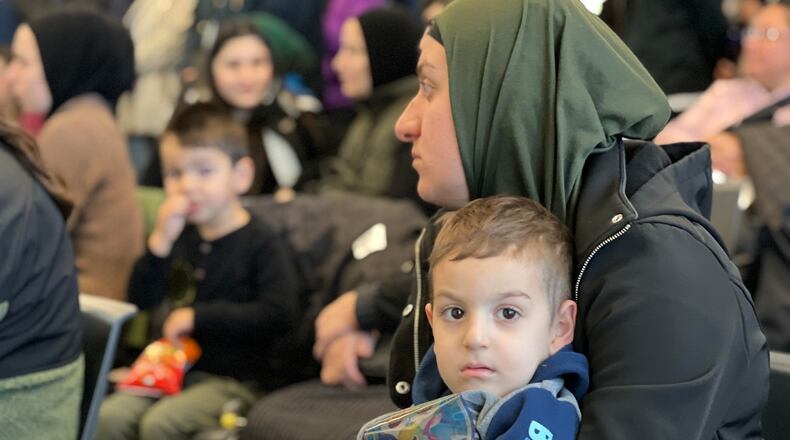By partnering with Catholic Social Services and the Miami Valley Career Technology Center’s Aspire program, the city of Dayton aims to equip newly arrived Ukrainians, as well as those who have resided within the region for longer, with services necessary for a smooth transition into the community, said Welcome Dayton Coordinator Jeannette Horwitz. This includes things like English language education, health care, and legal services.
“Events like this where organizations, as well as people from the community, come out and spend a couple of hours meeting and interacting with these individuals is a great way to say, ‘Hey, how can I help?’” Horwitz said. “You know, maybe someone is a retired English professor and can offer to help someone learn conversational English ... it’s a wonderful opportunity for things like that.”
Ukrainians of all ages were in attendance Saturday, including Maksym and Tonya Abramiuk, a pair of siblings who moved to America three years ago with their mother and step-father. Tonya, 12, is a student at Centerville City Schools, and Maksym, 20, works for FedEx in Fairborn.
Originally from an area just outside of Kyiv, the two said they had never been to America prior to moving here.
“We used to live in Czech Republic for 10 years and we already had that kind of experience with moving, so we were mentally prepared,” Maksym said.
Tonya agreed, saying the big move wasn’t too rough, but added that she was “basically at zero level” in terms of comprehension of the English language, though she speaks fluently now. Maksym, who had taken classes in Ukraine, had a bit of a leg up.
“It was really hard for me,” Tonya said.
The siblings agree that America is very different from their home country and in many ways. “The people are different, how stuff works, the culture, the norms,” Tonya said.
“I would say people are more open. People (here in America) are more confident about themselves and everything they do,” Maksym said, later adding, “People are also more open about sharing their own opinion, when in Ukraine, everybody still has their opinion, but they sometimes prefer to keep it in their mind and not share it with everyone.”
Tonya said people in America often come across overall as more friendly in social situations, and while Maksym agrees, he also noted the country has its quirks.
“America is a lot,” he said jokingly.
The Abramiuks’ immigration to the United States was part of their parents’ search for better job opportunities, the siblings said. While this is the case for other Ukrainian emigrants, as well, the Russian invasion of the country earlier this year has spearheaded a humanitarian crisis which has led to a sharp uptick in Ukrainians seeking refuge in America.
Around 7 million Ukrainians have sought refuge across Europe since the Russian invasion in February, most of them women and children, since men aged 18 to 60 are not allowed to leave the country. This is according to an October report by the Center for Immigration Studies.
In its response to the crisis, the U.S. Congress in May approved $40 billion in aid for Ukraine and other countries impacted by the conflict, the sixth aid package since the crisis began and $16 billion of which is directed toward humanitarian assistance, including $350 million for migration and refugee assistance to provide support for refugee outflows from Ukraine. The Biden administration in March pledged to accept 100,000 Ukrainians under a new resettlement program, a number that was reached in just a few months.
Yuliya Goncharuk fled Kyiv in April with her husband, Oleg, and their son, Denys. The family now lives with a host family in Centerville, who is helping them adjust to life in America.
“We came with one suitcase because of the war; at 5 o’clock in the morning, we (heard) a bomb attack, so we grabbed some clothes and documents and ran away,” Goncharuk said. “After that, we never came home. We came here to America because it was a safe place.”
Goncharuk said she is thankful for the assistance she has received in America, which has helped her cope with the incredible losses her family has endured.
“I lost my previous life; I lost my job and all that I knew, and now I need to start a new life here,” she said.
Back in Ukraine, Goncharuk worked as an economist and as an aesthetician. Since being in America, she said she has been painting more often in her spare time.
“I like abstract because it’s always in different shapes and mixed colors,” she said, pointing to a piece she had completed using the “abstract pour painting” method, which involves mixing poured paint by shifting and tilting the canvas in all directions. “I like it very much because (each painting is unique).”
Painting is a hobby Goncharuk has long loved but which she was rarely able to practice in her previous life.
“I didn’t have the time; it’s like sometimes you’re just too busy,” she said. “I started painting again because I have a lot of free time now without work, and my son likes painting too, so we started painting together in America.”
About the Author


